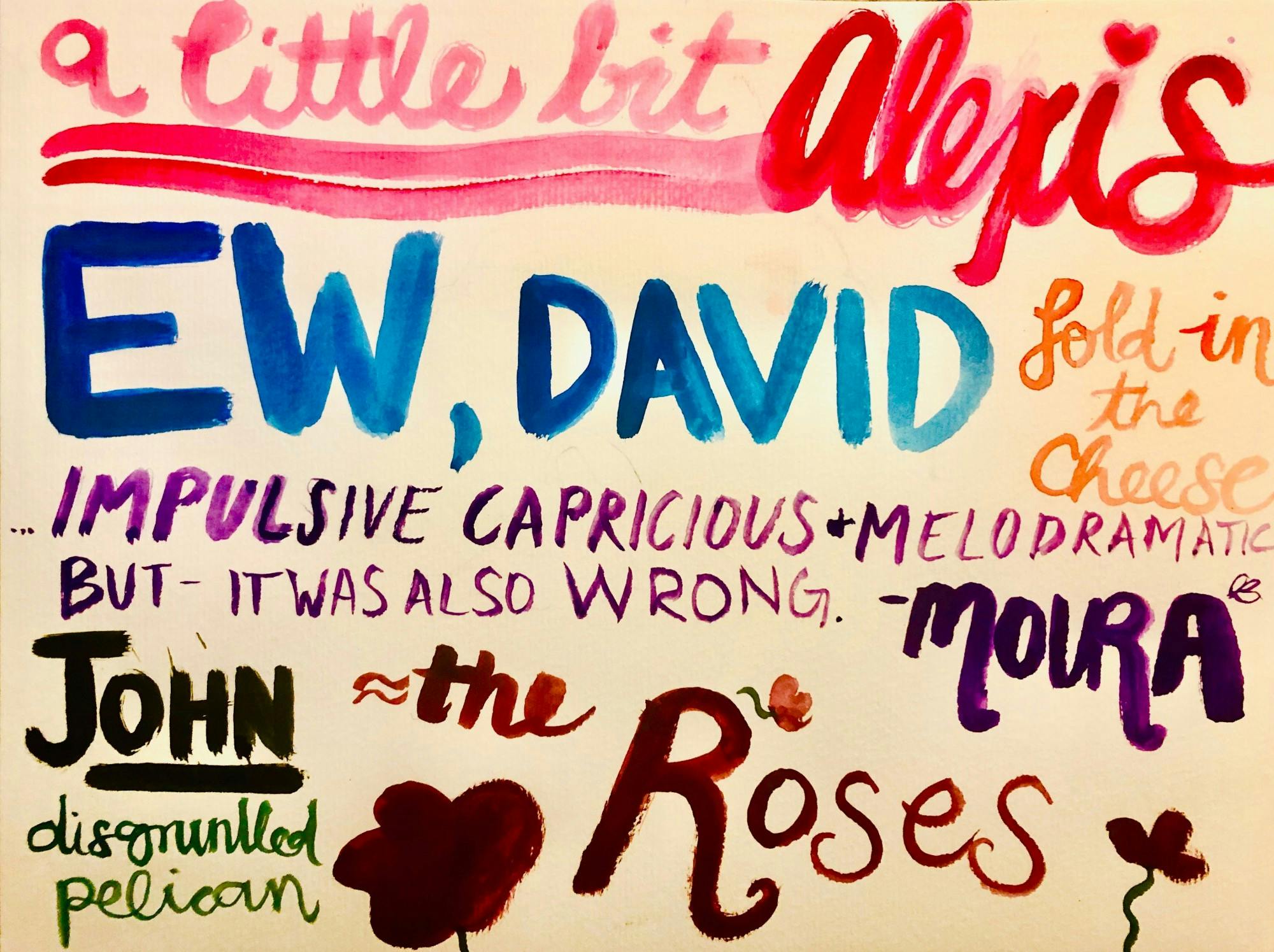On Oct. 3, Netflix released the sixth and final season of the Canadian comedy series “Schitt’s Creek.” Originally aired in Canada on CBC and in the U.S. on Pop TV, the show deftly and hilariously tells the story of the once-wealthy Rose family, who have fallen from grace and must live in the small town of Schitt’s Creek.
After moving from their New York mansion to two adjacent motel rooms, the Roses must adapt to both a new lifestyle and a new set of quirky neighbors. Meanwhile, the down-to-earth locals must learn to live with the extravagance of the Roses.
While the first few seasons center almost entirely around humor, the series progresses into a more plot-centered show. By the final season, the humor becomes more of a complement to the complex plot and the developing lives of the characters. Whereas each episode in the beginning of the show stands alone with a new, whacky storyline about the awkward encounters between the Rose family and the residents of Schitt’s Creek, the final episodes focus on larger topics.
While the show is still at its core a comedy, the final season largely centers around reflection, highlighting how far the Roses have all come. While the four of them each experience high and low points in their respective lives over the season’s 14 episodes, the writers use a combination of humor and displays of familial support to express an overwhelming feeling of comfort. The viewer easily gets sucked into this silly, wholesome world, especially during a time when so much of our present-day news brings us to tears of frustration and horror, not happiness.
By the end of the season, brother and sister David Rose (Dan Levy) and Alexis Rose (Annie Murphy) both have successful and fulfilling businesses. David continues his success as the owner of a local apothecary, and Alexis has made a name for herself as a publicist by promoting her own mother’s movie, “The Crows Have Eyes III.” Both also face big changes in their love lives. David gets married to the man who taught him it was safe to trust the people he loves, and Alexis is ready to start afresh after parting ways with her first true love, finally understanding her own potential as an independent woman.
Simultaneously, Johnny Rose (Eugene Levy), the father of the family, begins expanding his own business with a new pair of partners, both of whom are Schitt’s Creek natives. Throughout the season, Johnny’s business purchases the motel where they live and makes plans to expand the company by renovating small-town motels into welcoming retreats for tourists. Moira Rose (Catherine O'Hara), the family’s mother, realizes her self-worth within the acting industry. As a former soap opera star, Moira rediscovers the spotlight through her new movie, and the industry that had kicked her onto the floor one too many times finally comes crawling back.
The season is a real family affair. Not only do the events center around a family, but real-life father and son Eugene Levy and Dan Levy play father and son Johnny and David Rose. The duo also co-created, co-wrote and co-produced the series. Dan Levy’s sister Sarah Levy also has an acting role on the show — she plays Twyla Sands, the waitress at the town’s one restaurant, Cafe Tropical.
Themes of family, love and acceptance make the season feel like an escape from the divided world in which we currently live. “Schitt’s Creek” takes place in a town that looks like some of the more conservative places in the U.S. However, the show stays far away from politics, and the relatively diverse townspeople all live happily beside each other. In fact, David, an openly pansexual character who has both male and female love interests throughout the show, faces no homophobia. In the series finale, he and his male fiance Patrick Brewer (Noah Reid) get married, and the whole town joyously attends.
When designing the show as a whole, Dan Levy, who is gay, knew he did not want to have any homophobic or racist characters. He sought to create a show free of hatred, and a series that would serve as a breath of fresh air for members of the LGBTQ+ community and people glued to the strife that overwhelms so much of today’s political climate.
One scene from the show’s final run that really drives this message home occurs toward the end of the season. Johnny is returning from a business pitch in New York with his new partners, Schitt’s Creek’s mayor Roland Schitt (Chris Elliot) and Stevie Budd (Emily Hampshire), the woman who manned the desk of the motel when the family first moved in.
Looking back toward the first episode of the series, the trio seems like a very odd grouping. During the first day of the Roses’ three years in Schitt’s Creek, Johnny curses Roland out to make him leave the family alone, and Roland removes the doors to the Rose family’s rooms out of spite. Stevie, meanwhile, coldly broke the news to the family that they will be living in connecting rooms, not a suite, and seems unphased even when Moira accuses her of stealing her diamond earrings later in the episode.
However, over the course of the show, Stevie, Roland and Roland’s wife Jocelyn (Jennifer Robertson) all become a sort of extended family to the Roses. In fact, Roland and Jocelyn name their new baby Roland Moira Schitt in season four, and Stevie, who has become David’s best friend, walks down the aisle arm-in-arm with Johnny on David’s wedding day.
In the scene after the business meeting, Alexis, David, Jocelyn, Moira and Patrick are all waiting outside the motel together to hear if the pitch was a success. We see Alexis, Jocelyn and Moira all holding hands, and after Johnny delivers the good news, all characters, blood relatives or not, share an embrace and cheer in unison.
“We did it. We all did it,” Johnny says, emphasizing how everyone, from family member to loving neighbor, was vital to the achievement.
It is hard to not cry while watching the scene. For one, it marks a goodbye, since Johnny will now need to follow the business to New York, leaving behind those he’s come to love. But it also shows how far all the characters have come.
To me, the members of the Rose family almost felt like a part of my own family. While I originally watched the season as it came out on Pop, I also rewatched it upon its release on Netflix. That same week, I also lost a member of my own family, making the message of appreciating those you love ring even more true in my eyes.
Though three of the four Rose family members leave Schitt’s Creek for the big cities of Los Angeles and New York, we know that they will not leave behind the lessons they learned while living there. They now know to always rely on their loved ones for help and to appreciate people for their hearts rather than their wallets.
On the other side, the audience also must say goodbye to Schitt’s Creek, allowing the beloved characters to slip into the world of unwritten fiction. Even as we depart with the storyline after only six short seasons, we are satisfied knowing that they have found love and fulfillment in a world as broken as the present day. Maybe our country could look a little different if we learned a bit from the Roses.




